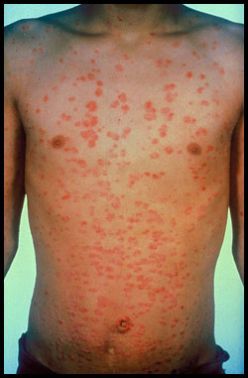Some of them are: Click Here To continue >>
All You Need to Know About Psoriasis
Psoriasis is a complicated disease which can occur due to two reasons
- Genetic
- Immune mediated
Genetic
Psoriasis can run in the family. Many patients who have reported this have a genetic history of this disease.
Immune mediated
In carious cases, the disease occurs when the person has had a traumatic experience, stressful life or a sudden shock. But it’s not necessary that the disease arises only post a trigger, it can also be idiopathic (no known cause). When this disease is triggered, it can result in a severe release of leukocytes (T cells) to the dermis and epidermis causing the scaly, psoriatic plaques. Histologic examinations reveal presence of T cells in large numbers in psoriatic lesions. Studies have shown that if 20 % of the body surface is affected with psoriasis lesions, it has around 8 billion blood circulating T cells and the dermis and epidermis have 20 billions T- cells. Due to this there is an unregulated process which produces various cytokines. It can also occur due to increased activity of t-cells in the skin.
Occurrence
This is disease is more common in patients who smoke, drink alcohol, suffer from depression and have suicidal tendencies. It is also associated with presence of other diseases such as cardiovascular disease, lymphoma, metabolic syndrome, melanoma and cancer.? Patients who are taking potential harmful and light therapies are also at the risk of contracting this disease. Psoriasis is also said to have an effect of a person’s mental equilibrium.? This disease can impact the quality of life and may shorten the person’s life span. As it involves the palms and soles, it affects person’s daily activities.
Symptoms of psoriasis
- Aggravation of chronic erythematous scaly area
- Sudden appearance of many small areas of scaly redness
- Streptococcal throat infection, viral infection and immunization
- Antimalarial drug, or trauma
- Family history of similar rash
- Pain
- Pruritus
- No fever
- Vesicles
- Long-term rash along with joint pain
- Cassation of steroid therapy.
Types of psoriasis
- Plaque psoriasis– Presence of raised and inflamed lesions which are covered with a silvery white scale and are characterize??plaque psoriasis. These scales can brushes away to reveal inflamed skin beneath. This is usually found on the knees, elbows, scalp, and trunk.
- Gutatte psoriasis– These are characterized by presence of pink papules which are 1-10 mm in diameter. They are commonly found on the trunk in the form of scaly lesions. It appears 2-3 weeks post an upper respiratory tract infection (URI) due to streptococci. ??This form of psoriasis occur post streptococcal infection in the pharyngitis, post steroid therapy or after using antimalaril drugs.
- Pustular psoriasis– This present in the form of non-infectious pustules which mainly appear on the palms and soles and in some cases, they are also found on other parts of the body. This form of psoriasis usually occurs first as erythema then pustules and finally as scales.
- Nail Psoriasis- these are characterized by pits on the nails which thicken and develop a dirty, yellowish tinge. On aggravation, the nails get separated from the bed.
- Psoriatic arthritis- This disease affects 10- 30 % of present skin symptoms. The arthritis is usually present in the extremities, i.e the hand and feet and at times the large joint which can cause stiffness, pain and may aggravate to the stage of damaging the joints.
- Inverse psoriasis‘ This is a rare form of psoriasis which in areas which are moist such as the armpits, groin, under the breast and in the skin folds. During inverse psoriasis, the skin appears smooth due to inflamed lesions, without scaling.
- Erythrodermic psoriasis- This form of psoriasis is characterized by pain, itching, erythema and fine scaling. Erythrodermic psoriasis occurs all over the body and is usually accompanied by fever, chills, hypothermia and dehydration.
- Scalp psoriasis- This type of psoriasis affects 50 % of patients and occurs in the form of erythematous raised plaques. It results in formation of silvery white scales on the scalp.
- Oral psoriasis– Oral psoriasis is characterized by presence of whitish lesions inside the mouth which tends to get aggravated easily. It can also be found as severe cheilosis which can spread to the skin around it.
Treatments
There are various treatments available which are administered based on the type of psoriasis and the condition of the patient. The three most common modes of treatment available are-
- Oral medications
- Injections
- Light therapy
Oral medications for psoriasis ‘
- Methotrexate– the patient is usually put on this drug for a week at doses ranging from 2.5 to 25mg. This drug has an immunomodulatory effect and helps to control psoriasis which affects skin, nails and joints.
- Acitretin- acitretin is a retinoid. It is effective in treating pustular psoriasis. ??This drug has ill effects on women who are in the reproductive cycle and hence is only given to men and women post menopause. This drug inhibits cell replication by controlling cellular differentiation inside the epidermis.
- Neoral- this is usually given to people who have had organ transplant and hence develop immunosuppressant psoriasis. This is usually given to people when their disease reaches a severe stage. It also has strong side effects such as kidney toxicity, hypertension, skin cancer and lymphomas.
Injections- injections helps to suppress the immune system and have a faster effect than oral drugs. Some of the most common injections are
- Alefacept
- Adalimubab
- Infliximab
- Etanercept
- Ustekinumab
Light therapy- Most of the people with psoriasis show a market improvement on receiving light therapy. UVA and UVB rays affect the chemical reactions due to which the skin cells do not multiply easily and remain normal.


